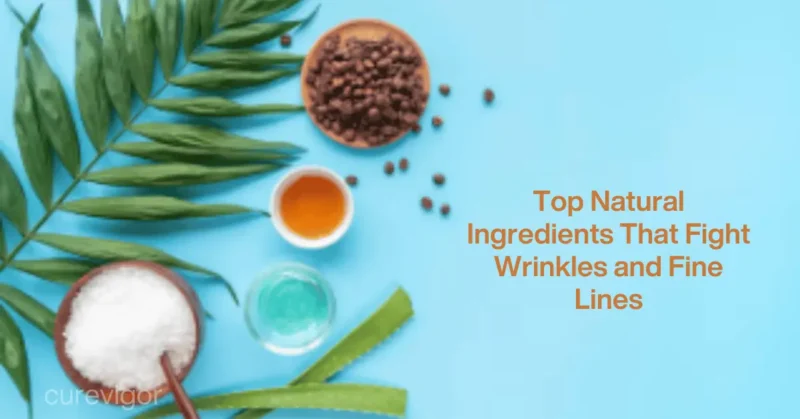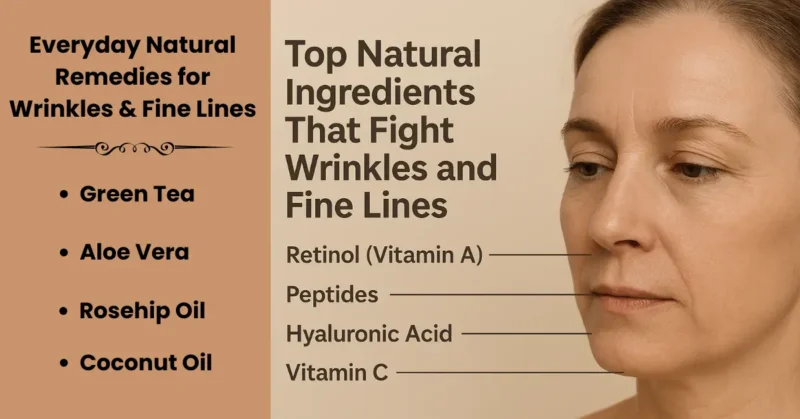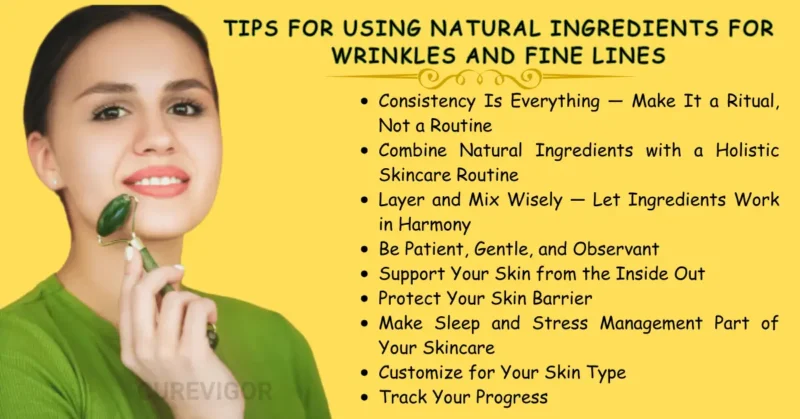Find out how natural ingredients such as vitamin C, retinol, peptides, and rosehip oil work to fight wrinkles, soften fine lines, and enhance your skin’s glow.
Thank you for reading this post, don't forget to subscribe!Aging is natural — but looking older than you feel doesn’t have to be. While store shelves overflow with anti-aging products promising miracles, the real magic often lies in nature.
In this post, you’ll learn how natural ingredients like retinol, peptides, vitamin C, and botanical oils can help reduce wrinkles and fine lines, boost collagen, and bring back your skin’s youthful glow — safely, gently, and effectively.
How Nature Helps Reduce Wrinkles and Fine Lines
As we age, our skin tells the story of our lives — laughter, stress, sun exposure, and time all leave their mark. Wrinkles and fine lines are the most visible signs of aging, and while there’s no stopping time, there are ways to help your skin stay firm, radiant, and youthful for longer.
In a world overflowing with anti-aging creams, serums, and treatments, many people are turning to natural ingredients to fight wrinkles and fine lines. These ingredients, found in plants, oils, and vitamins, can nourish, protect, and rejuvenate the skin without the use of harsh chemicals.

In this guide, we’ll dive deep into the top natural ingredients that fight wrinkles and fine lines, explore why these lines appear in the first place, and share tips on how to make the most of these skin-loving remedies.
Understanding Wrinkles and Fine Lines
Before we explore nature’s best anti-aging ingredients, it helps to understand why wrinkles and fine lines form.
Wrinkles are creases, folds, or ridges that develop on the skin as a result of aging and environmental exposure. Fine lines are their earlier, subtler versions — small, shallow lines that often appear around the eyes, mouth, and forehead.
1. Loss of Collagen and Elastin
Collagen and elastin are the structural proteins that give skin its firmness and bounce. When we’re young, our skin produces them abundantly, keeping it plump and elastic. As we age, this production slows down.
By our 30s and 40s, collagen levels can drop by as much as 1% each year, leading to sagging and the formation of wrinkles.
2. UV Damage
Sun exposure is one of the biggest culprits behind premature aging. Ultraviolet (UV) rays penetrate deep into the skin, damaging collagen fibers and generating free radicals that break down skin cells. The result is photoaging — rough texture, pigmentation, and, of course, wrinkles.
3. Environmental Stressors
Pollution, smoking, poor diet, and even lack of sleep all accelerate the skin’s aging process. These stressors produce oxidative stress, which weakens skin cells and reduces their ability to repair damage. Over time, this cumulative damage shows up as fine lines and dullness.
Fortunately, nature offers a toolbox of anti-aging nutrients and compounds that can help the skin repair itself, stay hydrated, and naturally rebuild collagen.
Top Natural Ingredients for Wrinkles and Fine Lines
Let’s explore the heavy-hitters — the natural ingredients scientifically proven to improve skin elasticity, hydration, and smoothness.
1. Retinol (Vitamin A)
Retinol, a form of vitamin A, is one of the most effective ingredients for reducing wrinkles and fine lines. It accelerates skin cell turnover and stimulates collagen production, resulting in smoother, more youthful-looking skin.
While synthetic retinoids are ordinary in skincare, natural sources of vitamin A include rosehip oil, carrot seed oil, and sweet potato extract. These are gentler on the skin and provide additional nutrients, such as beta-carotene and antioxidants.
When used consistently, retinol helps fade age spots, smooth rough patches, and restore firmness — all without resorting to harsh chemicals.
2. Peptides
Peptides are short chains of amino acids that act as building blocks for collagen and elastin. When applied topically, they signal the skin to produce more collagen, helping to repair and strengthen the skin barrier.
Naturally derived peptides can be found in ingredients like soy, oats, and certain algae extracts. They support firmness and elasticity, making the skin appear tighter and more toned over time.
The best part? Peptides are suitable for all skin types, including sensitive skin, as they help strengthen without irritation.
3. Hyaluronic Acid
Hyaluronic acid (HA) is a natural molecule found in the skin that can hold up to 1,000 times its weight in water. As we age, the amount of HA in our skin decreases, leading to dryness and the appearance of fine lines.
Natural sources of hyaluronic acid include root vegetables, leafy greens, and ingredients like tremella mushroom (also known as snow mushroom), which mimics the moisture-binding effects of synthetic HA.
When applied to the skin, HA helps hydrate deeply, plumping up fine lines and giving the skin a dewy, supple appearance. It also creates a protective barrier that prevents moisture loss.
4. Vitamin C
Vitamin C is a powerhouse antioxidant that brightens skin tone, stimulates collagen production, and protects against environmental damage. It neutralizes free radicals from UV exposure and pollution, which are major contributors to aging.
Natural sources of vitamin C include citrus fruits, rosehip oil, acerola cherries, camu camu, and Kakadu plum (one of the richest sources of vitamin C on Earth).
Topical vitamin C serums or masks help reduce pigmentation, even out skin tone, and minimize the depth of wrinkles over time.
5. Glycolic Acid
Glycolic acid is an alpha-hydroxy acid (AHA) derived from sugarcane. It’s one of the smallest AHA molecules, which allows it to penetrate deeply into the skin. It gently exfoliates dead cells, revealing smoother, fresher skin underneath.
By promoting cell turnover and stimulating collagen, glycolic acid improves texture and tone while reducing the visibility of fine lines.
When using natural glycolic acid sources, such as sugarcane, pineapple, or unripe papaya, you achieve mild exfoliation without stripping the skin’s natural oils.

Top Proven Natural Ingredients for Wrinkles and Fine Lines
Beyond the heavy hitters mentioned above, many plant-based ingredients have been used for centuries due to their skin-regenerating properties. Let’s take a look at some of nature’s most effective wrinkle-fighting allies.
1. Green Tea
Green tea is loaded with antioxidants, particularly catechins like EGCG (epigallocatechin gallate), which help protect skin cells from UV and pollution damage. It also reduces inflammation and improves elasticity.
Topical green tea extracts or DIY masks made from cooled green tea can help calm redness, balance oil production, and combat oxidative stress — all of which can slow down the appearance of wrinkles.
Regular use helps the skin stay firm, clear, and naturally radiant.
2. Aloe Vera
Aloe vera is one of the most versatile and soothing natural skincare ingredients. It hydrates, calms irritation, and supports the skin’s healing process.
The gel from the aloe plant is rich in vitamins A, C, and E — all of which are antioxidants that help protect against free radicals. Aloe also promotes collagen production and helps the skin retain moisture.
Daily use of aloe vera gel can make fine lines appear softer and give the skin a refreshed glow. It’s especially effective when used after sun exposure or as a natural moisturizer for dry or sensitive skin.
3. Coconut Oil
Coconut oil is packed with fatty acids and antioxidants that nourish and hydrate the skin. It helps strengthen the skin barrier, reducing water loss and keeping the skin supple and hydrated.
The lauric acid in coconut oil also has antimicrobial properties, which can help keep the skin clear and smooth. While it’s not for everyone (those with oily or acne-prone skin should use it sparingly), it can be a deeply moisturizing treatment for dry or mature skin.
When applied regularly, coconut oil helps reduce roughness, soften fine lines, and restore a youthful glow.
4. Rosehip Oil
Rosehip oil is a true multitasker for anti-aging. It’s rich in essential fatty acids, antioxidants, and natural vitamin A (retinoic acid). This makes it one of the most effective natural remedies for wrinkles, scars, and uneven skin tone.
Rosehip oil helps regenerate skin cells and boosts collagen production. It also contains vitamin C and lycopene, which help reduce oxidative stress and promote brighter, smoother skin.
Used nightly, rosehip oil can fade fine lines, diminish age spots, and leave skin silky and luminous.
Tips for Using Natural Ingredients for Wrinkles and Fine Lines

Using natural ingredients for anti-aging isn’t just about applying a few oils or serums and hoping for the best. It’s about building a mindful, consistent skincare ritual that allows nature’s nutrients to transform your skin over time, truly.
Below are expanded, practical, and science-backed ways to maximize the benefits of these natural wrinkle-fighting ingredients.
1. Consistency Is Everything — Make It a Ritual, Not a Routine
One of the biggest mistakes people make with natural skincare is giving up too soon. Natural ingredients work in harmony with your skin’s biology — not against it — which means they take time to produce visible changes. Collagen regeneration, cell turnover, and skin barrier repair don’t happen overnight.
Think of it this way: your skin renews itself roughly every 28 days, but as you age, that cycle slows down to 40–60 days. To truly see the benefits of ingredients like retinol, peptides, and vitamin C, you need consistent use for at least 8–12 weeks.
Make it a self-care ritual — not a rushed task. Apply your products slowly, massaging them in to stimulate blood flow. Use this time to relax; stress itself can accelerate aging by increasing cortisol levels, which break down collagen.
The more consistent and mindful you are, the better your results will be.
2. Combine Natural Ingredients with a Holistic Skincare Routine
Natural ingredients deliver their best results when they’re part of a balanced skincare routine. For instance:
- Cleanse gently: Use a mild, non-irritating cleanser that gently removes dirt and pollutants without stripping your skin’s natural moisture. Harsh cleansers can undo the benefits of nourishing oils and serums.
- Tone naturally: A rosewater or green tea toner helps balance pH and prepare your skin for deeper hydration.
- Moisturize deeply: Follow up with hydrating agents like aloe vera, hyaluronic acid, or squalane oil to lock in moisture.
- Protect daily: Sunscreen is non-negotiable. Even the most potent natural ingredients can’t counteract the damage caused by unprotected sun exposure.
Also, try layering your products smartly — start with water-based serums (such as vitamin C or hyaluronic acid), followed by richer creams or facial oils (like rosehip or coconut). This ensures each ingredient performs at its full potential.
3. Layer and Mix Wisely — Let Ingredients Work in Harmony
Just because two ingredients are natural doesn’t mean they play nicely together. Some combinations can cancel each other out or even irritate the skin. For example, vitamin C and retinol are both powerful anti-aging agents; however, when used together, they can cause redness or dryness.
Instead, use vitamin C in the morning for antioxidant protection, and retinol at night to promote cell turnover.
Here’s a simple layering guide for best results:
- Morning: Cleanser → Vitamin C serum → Moisturizer → Sunscreen
- Evening: Cleanser → Peptide or Retinol Serum → Nourishing Oil (Rosehip or Coconut) → Night Cream or Aloe Gel
Avoid over-exfoliation. Natural acids, such as glycolic or lactic acid, are great, but using them too often can thin your skin’s barrier. Stick to once or twice a week, depending on your skin’s tolerance.
4. Be Patient, Gentle, and Observant
When switching to natural skincare, your skin might need time to adjust — especially if you’ve been using synthetic products before. This adjustment period can include mild purging, where breakouts appear as your pores detox. Don’t panic; it’s usually a temporary issue.
Start with lower concentrations and observe how your skin reacts. Introduce one new ingredient at a time, waiting at least a week before adding another. This helps identify what works best for you and minimizes irritation.
Also, treat your skin gently. Avoid aggressive scrubbing or harsh tools. Wrinkles and fine lines are not enemies to be “fought” violently — they’re signs of life and expression. The goal is to nourish, restore, and strengthen, not strip and stress your skin.
5. Support Your Skin from the Inside Out
Skincare doesn’t stop at the surface. What you feed your body has a direct impact on how your skin looks and feels. Think of your diet as internal skincare.
- Eat colorful produce: Berries, leafy greens, tomatoes, and citrus fruits are loaded with antioxidants that fight free radicals.
- Include healthy fats: Omega-3-rich foods, such as salmon, chia seeds, flaxseeds, and walnuts, help keep skin supple and hydrated.
- Stay hydrated: Water is the most affordable and effective skin elixir. Dehydration makes wrinkles appear deeper.
- Reduce sugar and processed foods: Excess sugar damages collagen through a process called glycation, which makes the skin stiffer and more prone to wrinkles.
You can also boost skin health with collagen-supporting supplements, such as vitamin C, zinc, and silica, or natural drinks like matcha and green tea, which offer internal antioxidant protection.
6. Protect Your Skin Barrier
Your skin barrier is your first line of defense against the signs of aging. It keeps moisture in and harmful elements out. Overuse of exfoliants, hot showers, or harsh cleansers can damage it, leading to dryness, sensitivity, and inflammation — all of which accentuate wrinkles.
To protect it:
- Use lukewarm water, not hot.
- Moisturize immediately after cleansing to lock in hydration.
- Avoid alcohol-heavy toners and strong fragrances.
- Include ceramide-rich products or natural oils, such as jojoba or almond oil, to restore lipid balance.
When your barrier is strong, your skin retains moisture more effectively, feels smoother, and appears visibly younger.
7. Make Sleep and Stress Management Part of Your Skincare
You can use every powerful natural ingredient on the planet, but if you’re not getting enough sleep or managing stress, your skin will still show signs of fatigue and fine lines.
During sleep, your body enters a state of repair — producing collagen, balancing hormones, and enhancing blood flow to the skin. Aim for 7–9 hours of quality sleep. Use a silk pillowcase to reduce friction on your face and prevent sleep lines from turning into permanent wrinkles.
Stress releases cortisol, which breaks down collagen and increases inflammation. To counteract it, try mindfulness practices, yoga, or even just five minutes of deep breathing before bed.
Your skin reflects your inner state — calm inside means calm, glowing skin outside.
8. Customize for Your Skin Type
Not every natural ingredient works for everyone. For example:
- Oily skin: Lighter ingredients, such as aloe vera, green tea, and hyaluronic acid, work best.
- Dry skin: Go for rich, emollient oils like coconut, rosehip, or avocado oil.
- Sensitive skin: Choose soothing ingredients like chamomile, oatmeal, and cucumber extract.
Understanding your skin’s needs ensures you’re not overwhelming it. Balance is the secret — you want enough nourishment without clogging pores or triggering irritation.
9. Track Your Progress
Finally, don’t just guess whether your natural skincare is working — track it. Take photos every few weeks in natural light and note how your skin feels. Is it smoother? More hydrated? Are fine lines softening?
Tracking helps you stay motivated and fine-tune your routine based on visible results. Remember, the goal isn’t perfection but healthy, resilient skin that ages gracefully.
The Science Behind Natural Anti-Aging
Modern research supports what ancient beauty traditions have known for centuries: natural ingredients can effectively slow down the visible signs of aging.
Antioxidants neutralize free radicals that damage skin cells. Vitamins and minerals strengthen the skin’s structure. Oils and humectants improve hydration, while natural acids boost renewal and brightness.
When combined, they create a holistic defense system that keeps the skin smooth, resilient, and glowing.
Conclusion: Nature’s Answer to Youthful Skin
Wrinkles and fine lines are part of life — signs of expression, experience, and time. However, with the right natural ingredients, you can maintain healthy, vibrant, and strong skin.
From retinol and peptides that boost collagen to hyaluronic acid, aloe vera, and rosehip oil, which hydrate and protect, nature offers a comprehensive toolkit to help your skin look its best.
Consistency, protection, and self-care are key. Treat your skincare routine as a ritual — not just a chore — and your skin will reward you with radiance and resilience at every stage of life.
Ready to refresh your skincare routine with nature’s most powerful age-defying ingredients? Start today — pick one or two natural boosters that fit your skin type, stay consistent, and watch your skin regain its smooth, radiant vitality.
If you found this guide helpful, share it with someone who’s chasing healthy, glowing skin — because great skincare is better when it’s shared.
Read more Health & Beauty Tips.
You might love:

